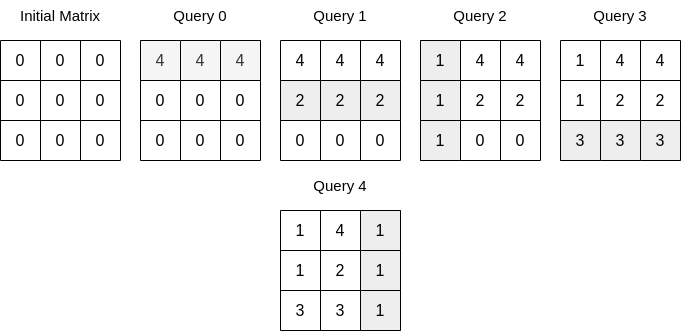Welcome to Subscribe On Youtube
2718. Sum of Matrix After Queries
Description
You are given an integer n and a 0-indexed 2D array queries where queries[i] = [typei, indexi, vali].
Initially, there is a 0-indexed n x n matrix filled with 0's. For each query, you must apply one of the following changes:
- if
typei == 0, set the values in the row withindexitovali, overwriting any previous values. - if
typei == 1, set the values in the column withindexitovali, overwriting any previous values.
Return the sum of integers in the matrix after all queries are applied.
Example 1:

Input: n = 3, queries = [[0,0,1],[1,2,2],[0,2,3],[1,0,4]] Output: 23 Explanation: The image above describes the matrix after each query. The sum of the matrix after all queries are applied is 23.
Example 2:

Input: n = 3, queries = [[0,0,4],[0,1,2],[1,0,1],[0,2,3],[1,2,1]] Output: 17 Explanation: The image above describes the matrix after each query. The sum of the matrix after all queries are applied is 17.
Constraints:
1 <= n <= 1041 <= queries.length <= 5 * 104queries[i].length == 30 <= typei <= 10 <= indexi < n0 <= vali <= 105
Solutions
-
class Solution { public long matrixSumQueries(int n, int[][] queries) { Set<Integer> row = new HashSet<>(); Set<Integer> col = new HashSet<>(); int m = queries.length; long ans = 0; for (int k = m - 1; k >= 0; --k) { var q = queries[k]; int t = q[0], i = q[1], v = q[2]; if (t == 0) { if (row.add(i)) { ans += 1L * (n - col.size()) * v; } } else { if (col.add(i)) { ans += 1L * (n - row.size()) * v; } } } return ans; } } -
class Solution { public: long long matrixSumQueries(int n, vector<vector<int>>& queries) { unordered_set<int> row, col; reverse(queries.begin(), queries.end()); long long ans = 0; for (auto& q : queries) { int t = q[0], i = q[1], v = q[2]; if (t == 0) { if (!row.count(i)) { ans += 1LL * (n - col.size()) * v; row.insert(i); } } else { if (!col.count(i)) { ans += 1LL * (n - row.size()) * v; col.insert(i); } } } return ans; } }; -
class Solution: def matrixSumQueries(self, n: int, queries: List[List[int]]) -> int: row = set() col = set() ans = 0 for t, i, v in queries[::-1]: if t == 0: if i not in row: ans += v * (n - len(col)) row.add(i) else: if i not in col: ans += v * (n - len(row)) col.add(i) return ans -
func matrixSumQueries(n int, queries [][]int) (ans int64) { row, col := map[int]bool{}, map[int]bool{} m := len(queries) for k := m - 1; k >= 0; k-- { t, i, v := queries[k][0], queries[k][1], queries[k][2] if t == 0 { if !row[i] { ans += int64(v * (n - len(col))) row[i] = true } } else { if !col[i] { ans += int64(v * (n - len(row))) col[i] = true } } } return } -
function matrixSumQueries(n: number, queries: number[][]): number { const row: Set<number> = new Set(); const col: Set<number> = new Set(); let ans = 0; queries.reverse(); for (const [t, i, v] of queries) { if (t === 0) { if (!row.has(i)) { ans += v * (n - col.size); row.add(i); } } else { if (!col.has(i)) { ans += v * (n - row.size); col.add(i); } } } return ans; }